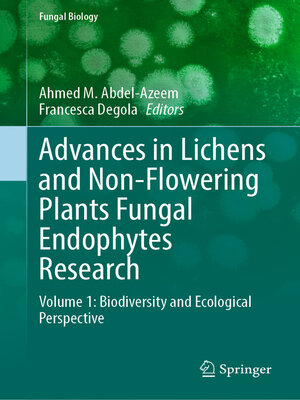Advances in Lichens and Non-Flowering Plants Fungal Endophytes Research
ebook ∣ Volume 1: Biodiversity and Ecological Perspective · Fungal Biology
By Ahmed M. Abdel-Azeem

Sign up to save your library
With an OverDrive account, you can save your favorite libraries for at-a-glance information about availability. Find out more about OverDrive accounts.
Find this title in Libby, the library reading app by OverDrive.



Search for a digital library with this title
Title found at these libraries:
| Library Name | Distance |
|---|---|
| Loading... |
Beneficial plant-colonizing fungi deliver benefits to their hosts by promoting growth, producing secondary metabolites, and enhancing resistance to biotic and abiotic stresses. Mycorrhizae and endophytic fungi are the hidden companions of plants, living a mutually beneficial life inside the host plant. With the development of techniques of molecular biology, it has become possible to establish the correct identity of these fungi, and to know their interactions with the host and other micro-organisms. The unique attributes of fungi thus herald great promise for their application in biotechnology and industry. Fungi can be grown with relative ease, making production at scale viable. The search for fungal biodiversity, and the constructionof a living fungi collection, have both incredible economic potential in locating organisms with novel biotechnological uses that will lead to novel products. Fungi have provided the world with penicillin, lovastatin, and other globally significant medicines, and they remain an untapped resource with enormous industrial potential.
Advances in Lichens and Non-Flowering Plants Fungal Endophytes Research, Volume 1 explores biodiversity and the ecological perspective of these fungi. It includes discussion of distribution patterns, saxicolous lichens, lesser-known lichens, fungi in the Amazon forest, hosted medical ferns, conifers, aquatic plants, gymnosperm trees, as well as specific studies on Ginkgo biloba, and the common Yew. A companion Volume 2 discusses bioprospecting for biomolecules and their applications in the medical, agricultural, and food industries. It should be useful to researchers and students studying fungal biology, biotechnology, microbiology, agriculture, molecular biology, environmental biology, and related subjects.







